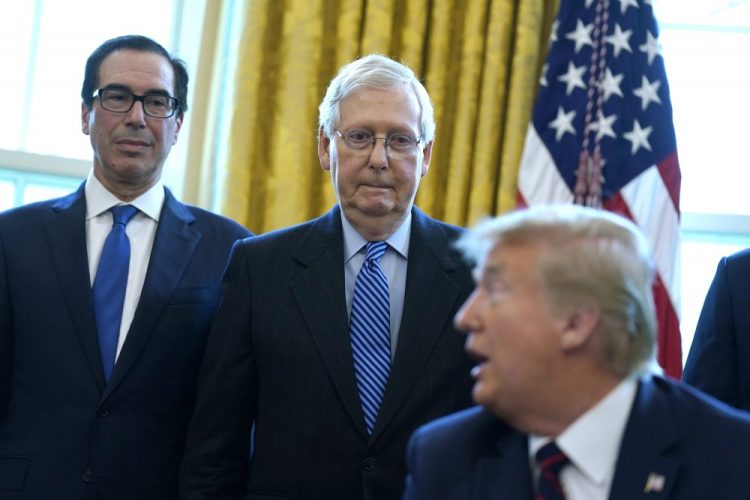WASHINGTON — Senate Majority Leader Mitch McConnell says President Trump’s impeachment trial distracted the federal government from the novel coronavirus as it reached the United States in January, despite warnings at the time from public health experts and members of Congress about the spread of the virus.
McConnell, a Kentucky Republican, told conservative radio host Hugh Hewitt on Tuesday that the deadly virus “came up while we were tied down on the impeachment trial. And I think it diverted the attention of the government, because everything every day was all about impeachment.”
The Trump administration has been severely criticized for its slow response to the spreading pandemic, especially for the shortage of coronavirus testing kits when the infection first spread to the U.S. from China. Trump initially downplayed the crisis, comparing it to the seasonal flu and declaring it may go away on its own. The administration also has been criticized for not supplying needed protective medical gear for health care workers tackling the crisis.
McConnell said Republican Sen. Tom Cotton of Arkansas was among the first in Congress to raise an alarm about the virus. Cotton, an outspoken critic of China’s communist government, has said he does not trust China to act truthfully about the virus.
“He was first, and I think Tom was right on the mark,” McConnell said. ”Tom figured this out early, and he was absolutely right.”
Cotton said earlier this month he was looking into holding China “accountable” for the coronavirus pandemic, which he referred to as the “Wuhan coronavirus.” The virus originated in the Chinese city of Wuhan.
“I am not a doctor. I am not a scientist. I am not an epidemiologist. But I could tell from the very beginning that the Chinese Communist Party was lying about everything related to this virus, and that we had to be prepared for the worst,” Cotton said March 16 on the Senate floor.
The U.S. death toll from the coronavirus has climbed past 3,400, eclipsing China’s official count.
The Trump administration briefed the Senate on Jan. 24 – during the impeachment trial – and again on Feb. 5, the day Trump was acquitted.
Still, the threat posed by the virus was not widely understood, and some lawmakers complained that Trump wasn’t taking the growing threat seriously. For weeks after the first U.S. case of the coronavirus was confirmed in January, government missteps caused a shortage of reliable laboratory tests for the coronavirus, leading to delays in diagnoses.
Republican and Democratic leaders of the Senate health and foreign relations committees issued a joint statement after the Jan. 24 briefing, declaring, “We are monitoring the outbreak of a novel coronavirus closely and are in close communication with United States government agencies on actions and precautions needed to prevent further spread of this virus.”
The statement said China “has taken steps to share information with international health experts” and thanked administration officials for providing an update.
Two days later, Senate Democratic leader Chuck Schumer called on the Department of Health and Human Services to declare coronavirus a public health emergency, freeing up $85 million for federal agencies. “Should the outbreak get worse they’re going to need immediate access to critical federal funds that at present they can’t access,” Schumer said.
The Trump administration declared a public health emergency for the entire U.S. on Jan. 31. “While this virus poses a serious public health threat, the risk to the American public remains low at this time, and we are working to keep this risk low,” Health and Human Services Secretary Alex Azar said at the time.
That same day, Trump imposed travel restrictions on China in response to the outbreak. Most major airlines had already suspended flights to China prior to the Jan. 31 announcement, following the lead of several major international carriers. An earlier State Department advisory told Americans not to travel to China because of the outbreak.
Despite those actions, the administration – and Trump himself – downplayed the virus for weeks before taking more drastic steps this month. Trump speculated last week that the country could be “opened up”’ by Easter, April 12, but has since said ”social distancing” guidelines should remain in place through April 30 at least.
The virus has caused a global pandemic that has sickened about 830,000 people and killed tens of thousands, according to figures compiled by Johns Hopkins University.
Send questions/comments to the editors.



Success. Please wait for the page to reload. If the page does not reload within 5 seconds, please refresh the page.
Enter your email and password to access comments.
Hi, to comment on stories you must . This profile is in addition to your subscription and website login.
Already have a commenting profile? .
Invalid username/password.
Please check your email to confirm and complete your registration.
Only subscribers are eligible to post comments. Please subscribe or login first for digital access. Here’s why.
Use the form below to reset your password. When you've submitted your account email, we will send an email with a reset code.